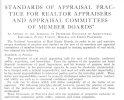jay trotta
Elite Member
- Joined
- Feb 8, 2004
- Professional Status
- Certified Residential Appraiser
- State
- Connecticut
The purpose of the evaluation was to create a format that involved less reporting. It is for circumstances where an institution may not want to pay for or determine they do not need a higher-level of valuation service provided by a USPAP compliant appraisal format. However, Standard 2 of USPAP pertains to communicating an appraisal analysis. Standard 2 of USPAP outlines the minimum requirements for reporting an appraisal. Standard Rule 2-1, General Reporting Requirements, details that an appraisal report “MUST clearly and accurately set forth the appraisal in a manner that will not be misleading”. It also states the report “MUST contain sufficient information to enable the intended users of the appraisal to understand the report properly (2020-2021 USPAP, Effective January 1, 2020 – December 31, 2021, pg. 20, Lines 573-579)“. For the past few years, a lender looking to secure an opinion of value in the form of an evaluation in the State of Connecticut had to use a licensed/certified real estate appraiser but, by law, the licensed/certified real estate was, until recently, bound by USPAP and could not provide an evaluation format without creating a report compliant with USPAP.
This conflict has now been resolved, as the CT Department of Consumer Protection adopted updated Real Estate Appraisal Regulations. The updates were approved by the CT Attorney General on July 19, 2021 and the Legislation Regulation Review Committee on September 28, 2021 becoming effective September 30, 2021. The changes were prompted by the Connecticut Real Estate Appraisal Commission. Section 20-504-2 (4) was added, which states: “..when an evaluation of real property collateral is required in lieu of an appraisal, a Connecticut certified appraiser may perform such evaluations outside the scope the USPAP by following Section XII (evaluation Development) and Section XIII (evaluation Content) of the Interagency Appraisal and evaluation Guidelines…”. The bottom line, in Connecticut, a lender can now use a licensed/certified real estate appraiser to complete an evaluation and a CT licensed/certified real estate appraiser can perform an evaluation and still comply with State of CT Law.
Not to be a pain, but as far as I can tell, this relates to State License Law, Not Lender Law
This conflict has now been resolved, as the CT Department of Consumer Protection adopted updated Real Estate Appraisal Regulations. The updates were approved by the CT Attorney General on July 19, 2021 and the Legislation Regulation Review Committee on September 28, 2021 becoming effective September 30, 2021. The changes were prompted by the Connecticut Real Estate Appraisal Commission. Section 20-504-2 (4) was added, which states: “..when an evaluation of real property collateral is required in lieu of an appraisal, a Connecticut certified appraiser may perform such evaluations outside the scope the USPAP by following Section XII (evaluation Development) and Section XIII (evaluation Content) of the Interagency Appraisal and evaluation Guidelines…”. The bottom line, in Connecticut, a lender can now use a licensed/certified real estate appraiser to complete an evaluation and a CT licensed/certified real estate appraiser can perform an evaluation and still comply with State of CT Law.
Not to be a pain, but as far as I can tell, this relates to State License Law, Not Lender Law


